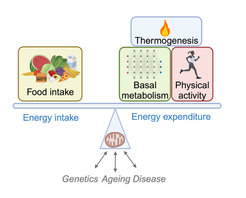Max Planck Research Group Sprenger
Molecular Metabolism & Energy Homeostasis
Environmental conditions such as physical activity, diet and exposure to stress all influence our metabolism. The ability of cells to adapt to changes in environmental conditions and metabolic stress declines as we age resulting in disrupted energy homeostasis, obesity and other age-associated metabolic diseases. Exercise training remodels metabolism and thereby can prevent and ameliorate many age-associated metabolic diseases, ultimately extending health span. In our research we study exercise and age-associated metabolic diseases to identify unknown molecular mechanisms that enable adaptation to changes in environmental conditions and metabolic stress.
To maintain energy homeostasis, cells have developed complex molecular metabolic networks. Intracellular compartmentalization enables the regulation of these metabolic networks, protects from reactive molecules, and establishes a unique chemical environment.
Mitochondria are cellular compartments controlling many metabolic pathways important to ensure functioning of these networks and maintain energy homeostasis. Intact mitochondrial compartments are key to enable our metabolism to adapt to changing environmental conditions such as diet, physical activity, or stress. As we age, mitochondrial function and the ability of our metabolism to adapt to changing environmental conditions decline, disrupting energy homeostasis and causing age-associated metabolic diseases. Exercise training significantly improves mitochondrial function, remodels metabolism and thereby can prevent and ameliorate many age-associated chronic diseases, ultimately extending our health span. However, our knowledge about the underlying molecular mechanisms remains far from complete.

The overall aim of our research group is to identify unknown molecular mechanisms controlling mitochondrial function, maintaining energy homeostasis, and protecting against age-related decline. To this end, we study mitochondrial metabolism in response to exercise and during age-associated metabolic diseases in different cell types in vivo and in cultured cells. We are interested in the role of small molecules during these processes and study how they regulate mitochondrial function and energy homeostasis on the molecular level.
With our research we hope to advance our understanding of the basic cellular mechanisms that enable adaptation to changes in environmental conditions and metabolic stress and we are keen to provide the basis to apply our findings to prevent and treat age-associated human diseases.
Selected publications
Ergothioneine boosts mitochondrial respiration and exercise performance via direct activation of MPST.
Sprenger, H.-G., Mittenbühler, M. J., Sun, Y., Van Vranken, J. G., Schindler, S., Jayaraj, A., Khetarpal, S. A., Smythers, A. L., Vargas-Castillo, A., Puszynska, A. M., Spinelli, J. B., Armani, A., Kunchok, T., Ryback, B., Seo, H.-S., Song, K., Sebastian, L., O’Young, C., Braithwaite, C., Dhe-Paganon, S., Burger, N., Mills, E. L., Gygi, S. P., Paulo, J. A., Arthanari, H., Chouchani, E. T., Sabatini, D. M., Spiegelman, B. M.
(2025) Cell Metabolism
Isolation of extracellular fluids reveals novel secreted bioactive proteins from muscle and fat tissues.
Mittenbühler, M. J., Jedrychowski, M. P., Van Vranken, J. G., Sprenger, H.-G., Wilensky, S., Dumesic, P. A., Sun, Y., Tartaglia, A., Bogoslavski, D., A, M., Xiao, H., Blackmore, K. A., Reddy, A., Gygi, S. P., Chouchani, E. T., Spiegelman, B. M.
(2023) Cell Metabolism
Fumarate is a terminal electron acceptor in the mammalian electron transport chain.
Spinelli, J. B., Rosen, P. C., Sprenger, H.-G., Puszysnka, A. M., Mann, J. L., Roessler, J. M., Cangelosi, A. L., Henne, A., Condon, K. J., Zhang, T., Kunchok, T., Lewis, C. A., Chandel, N. S., Sabatini, D. M.
(2021) Science
Cellular nucleotide imbalance triggers mitochondrial DNA-dependent innate immunity.
Sprenger, H.-G., MacVicar, T., Bahat, A., Fiedler, K. U., Hermans, S., Ehrentraut, D., Milenkovic, D., Bonekamp, N., Larsson, N.-G., Nolte, H., Giavalisco, P., Langer, T.
(2021) Nature Metabolism
Loss of the mitochondrial i-AAA protease YME1L leads to ocular dysfunction and spinal axonopathy.
Sprenger, H.-G., Wani, G., Hesseling, A., König, T., Patron, M., MacVicar, T., Ahola, S., Wai, T., Barth, E., Rugarli, E. I., Bergami, M., Langer, T.
(2019) EMBO Molecular Medicine
Highlights
| 2021 | Hope Funds for Cancer Research Postdoctoral Fellowship |
|---|---|
| 2020 | Deutsche Forschungsgemeinschaft (German Research Council) Postdoctoral Fellowship |
| 2014 | Cologne Graduate School of Ageing Research PhD Fellowship |
| 2013 | Graduate School for Biological Sciences Fast-Track Masters/Doctoral Fellowship |
